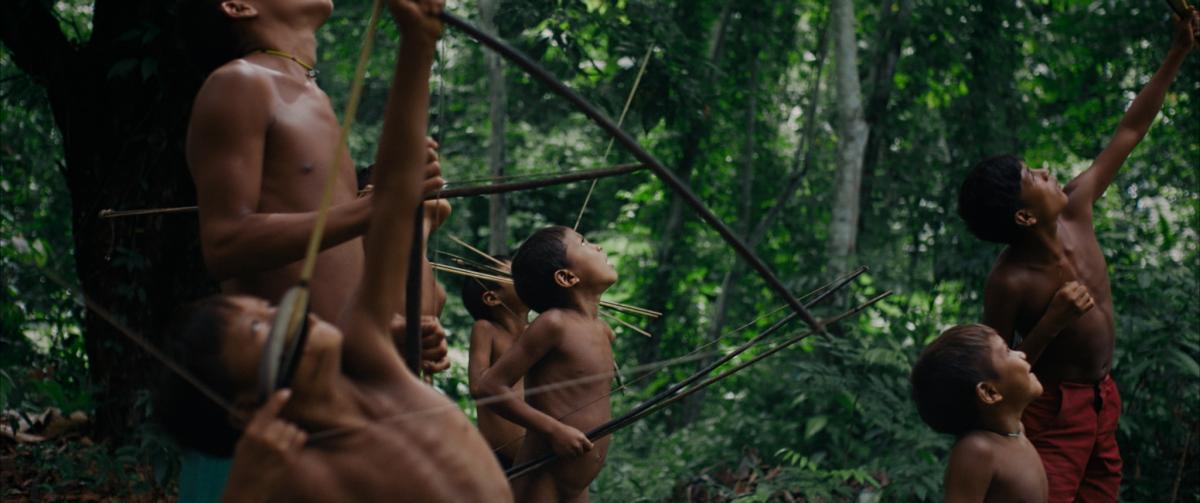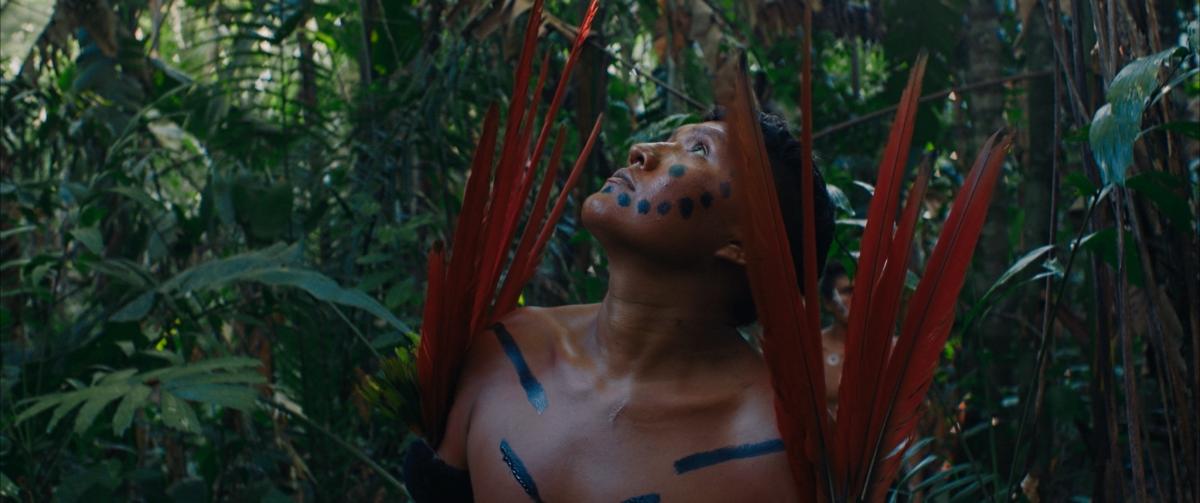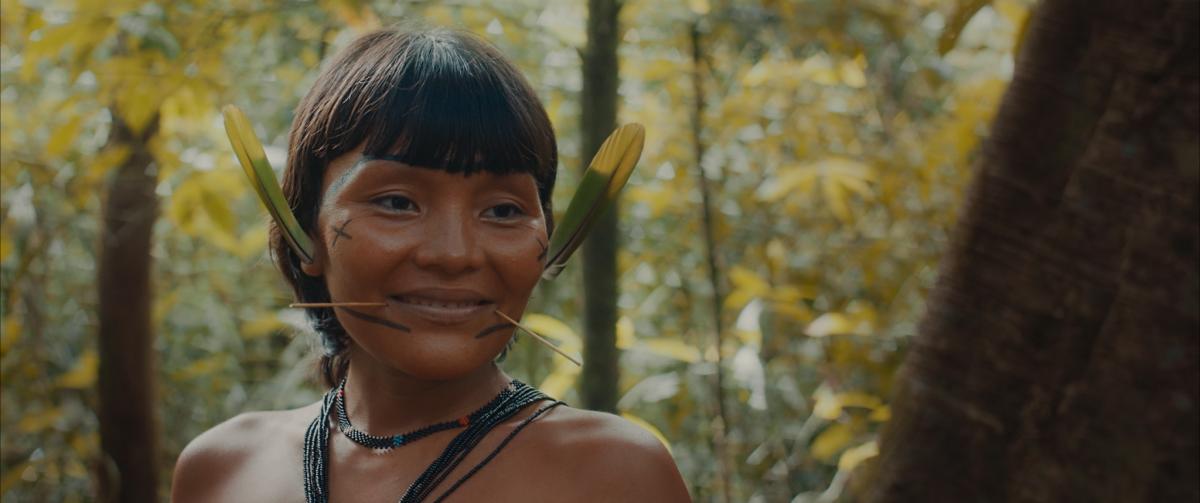Luiz Bolognesi (Sao Paulo, 1966) is a Brazilian film-maker and anthropologist whose film Bird-watchers won the One World Media Award, and Ex- Shaman Berlinale and won a special jury mention at the Berlinale. His new film The Last Forest, was co-written with David Kopenawa Yanomami, a shaman and spokesman for the Yanomami people. For 25 years he tirelessly led the long running national and international campaign to secure Yanomami land rights for which he gained recognition around the world.
As the title suggests, the film was made in a context of desperation, in which the Yanomami, are losing their protection from illegal miners, and Brazil has a president set against indigenous rights. Not only is Covid-19 threatening indigenous people, but deforestation is driving infectious agents, which could include Covid, out of the forest and into human communities. Or, as Davi says about white people: ‘you are eating your own stomach’.
LatinoLife: How do you think your film will help the Yanomami faced with a rapacious president like Bolsonaro?
Luiz Bolognesi: First it will show young Yanomami people how beautiful they are, how beautiful the old men and women are: even white people want to make films with them. One of their problems is that young men are attracted to consumer goods like mobiles, shoes. And to show how important the shamans are because they are in films and newspapers.
The second thing is to show the gold prospectors who have been arriving since 2019 after Bolsonaro was elected, and there are now 20,000 of them, that are working the land and using mercury which poisons the rivers, animals and human beings.
Since 1992 it has been illegal for gold miners to be on Yanomami land, and this was confirmed by the Brazilian congress. Before Bolsonaro, the army enforced the law and did a good job. They would arrive in helicopters, evict the gold miners, destroy their camps and take them to the police, and without killing people. But since 2019 the federal police and the army have stopped their work, so we hope that the film will bring some pressure to bear on the Brazilian Congress, and on public opinion inside and outside Brazil to ensure that the law is obeyed. Bolsonaro wants to change this law and allow prospecting.
As Davi says: ‘we live in the heart of the forest, not the edges, and if that is destroyed it will be a problem not just for them or for Brazil, but for all of South America and the world, because the rainfall and the rivers depend on the amazon forest. We are fighting for everyone.’

LL: How did the Indigenous people come to trust you as white people?
LB: I am not a young guy and I have been working here since I was 22, living with the Pataxó, where I am now, as an anthropologist and also teaching them Portuguese, because they need that. The first children I taught are now grandparents.
In Brazil we have more than 200 nations, speaking different languages. They have been here 2000 years, and resisting the political power, the scientific power and the religious invasions by the priests, so when I invited Davi to make a film about their resistance, not just to be the main character, but to help write the script, he agreed. He invited me and suggested that we spend some time, ‘so I can dream about the film’. To him a film is a dream, so we needed time to dream to decide what kind of film we are going to make. For them, dreams are just as real as everyday life, they are not treated as mere fantasies. I met him at 5 AM one morning and he said he was very tired. I said: “you’ve just been sleeping!” He said he was struggling all night with a jaguar that was trying to eat him, so it was very tiring.
Things that happen in the daytime, they only understand when they dream – “ah, this is the continuation of my dream”.
So, I decided to shoot the film so that dream sequences are shown as real life. Davi showed me how we would shoot the film, and then I left and came back with five more people to shoot, which took five weeks.

LL: Davi said that only the bosses make the money, not the prospectors, so who are these bosses?
LB: They are senators, very rich people, who bring the miners in with private planes, and they buy the gold at very low prices to sell to the US and Europe. The miners are very poor people living in very bad conditions, with many health problems, and they destroy everything because they don’t care about the jungle. When they sell the gold at low prices, they still have to pay the bosses for taking them there and for their food. It’s like drug trafficking, the gold goes to Amsterdam or New York, without paying any taxes, which is defrauding the Brazilian people.
The federal police have investigated, and the newspapers have reported, everybody knows that the planes that bring the miners belong to senators.
LL: In the film mostly mythical time is talked about – why did you decide to leave out the history of opposition to prospectors?
LB: This was the choice of Davi and the elders. For them mythical time is everyday time, they talk about Omame as if he was there among them. I said that when they are acting the myth they should not wear western clothes, because when Omame was here they didn’t dress this way, and he said: “How do you know?”
It’s like that, Omame could come to them through a mobile phone. They are present all the time. For example, when the man disappeared, they really couldn’t tell if he had been eaten by a jaguar, joined the gold-miners, or kidnapped by a woman in the river, all three possibilities were there. I wanted to show their daily life.
And there is a very important plot in the film of the Yehuana – a kind of feminist Yanomami girl, but the plot was decided by Davi and the old men, and they said that women don’t take these kinds of decisions in their culture. But every day this old woman Yamowama used to come and tell me the stories that she would bring to the film, so I said to Davi: “times are changing, women have to have a voice because they are fighting everywhere and resisting the same as you are. It doesn’t look good if a film shows the Yanomami are dominated by men”. He walked around and thought about it and then he said, “OK, Yehuana is a very strong woman, you can shoot her story.”
So, you see things are changing, everyday there are conflicts.
LL: When Davi went to Harvard he criticized white people ‘on the other side of the river’ for thinking everything is beautiful in the forest – but doesn’t your film reinforce that view?
LB: That was also Davi’s decision – he said he wanted to show the damage that the miners do, and also the attraction of money and consumer goods that they offer to the young people, but he said, “Luiz, I don’t want to make a film about victims. You, white people are the weak ones, not us – you are eating your own stomach, you are destroying the rivers where you live, because you don’t listen to the spirit anymore, the way your grandparents did. So, we must teach you, and the film must not show the Yanomami as sick people”.
I can take you to a village where you can see things like that, but we must show the Yanomami as healthy and beautiful, and living a sustainable life, then we can discuss our problems.
LL: We see that they are meat eaters, but the camera shies away when they kill an animal – were you worried about western sensibilities?
LB: No, it wasn’t that at all, it was because it was impossible for us to film. These animals, monkeys, or big ones like jaguars, are a long way from the village, at least 20Km. We tried to go with them on hunting trips, but they walk very fast, and we are just not strong enough, and the camera equipment is heavy. After two hours we had to give up. So, these scenes were performances staged near the village, except the one in the water, where he is really killing a small crocodile.

LL: Your film was sponsored by Ancine - was that difficult to achieve with Bolsonaro attacking all kinds of cultural activities?
LB: The money we got was from before Bolsonaro. Since 2019 it has become almost impossible. Two years ago, we had six films, last year eight, and this year just one. He wants to kill the forest and the future too. And now we also have the pandemic. I shot the film before the pandemic arrived, and then we worked on editing, but we can’t film now because of the virus.
LL: Do you have a new film in preparation?
LB: I am working on a series for a streaming company, which will tell the story of the indigenous people in the 16th Century, at the point when white people arrive in Brazil. I was invited to do this, because I also work as a screenwriter on films, and it will show their life before the Europeans arrived and how it changed as a result.
LL: How can people see The Last Forest?
LB: After the festivals, it will go to arthouse cinemas, and in the second half of the year, move to a streaming network, but we don’t know which channel it will be yet.















